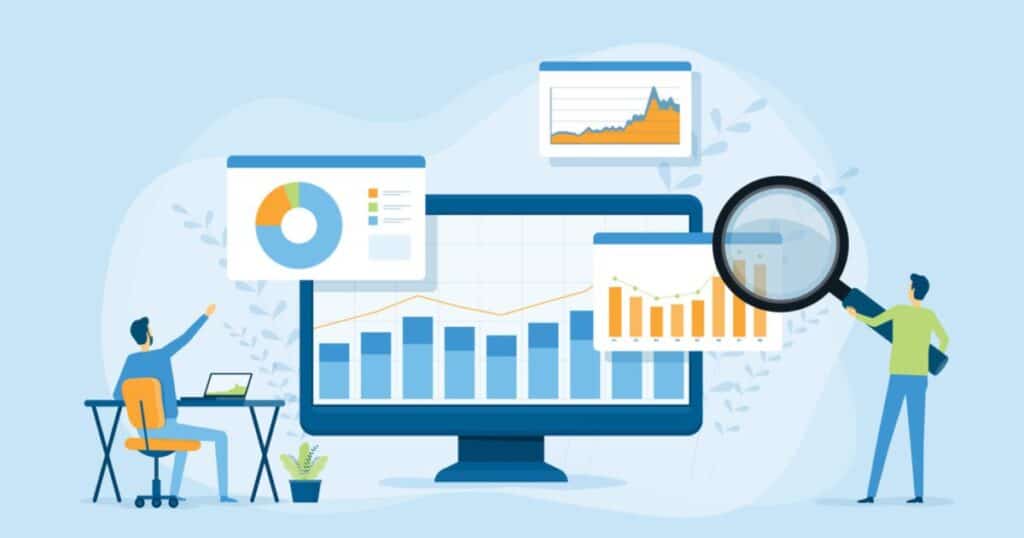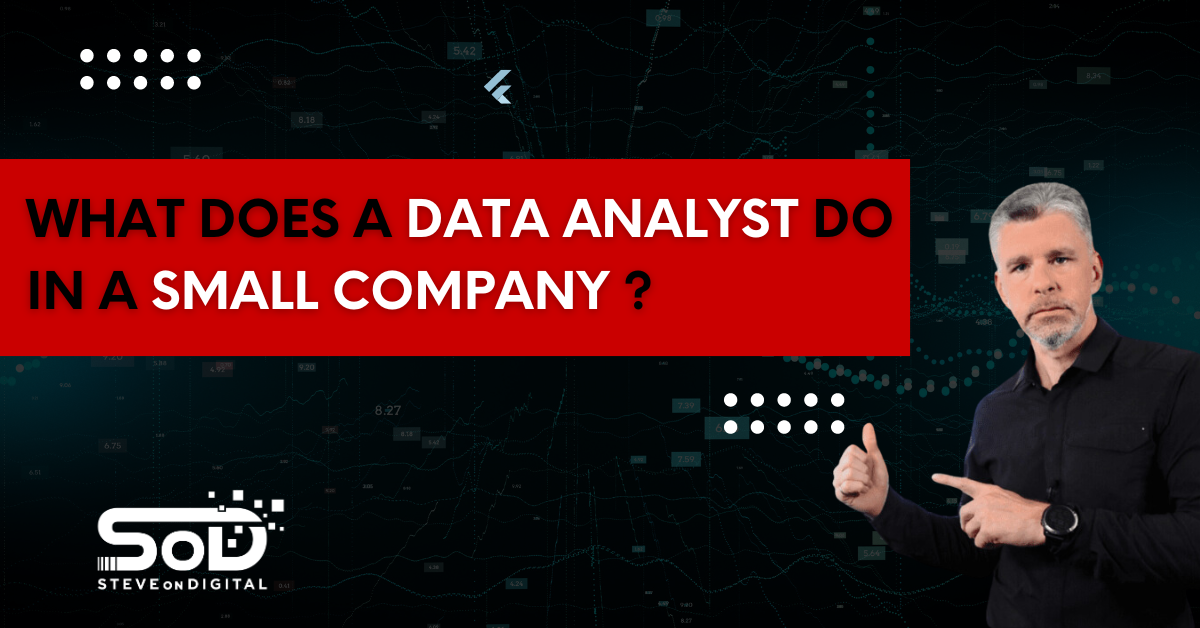Data analysis involves evaluating data sets to extract actionable insights that can inform business decisions.
In small companies, data analysis can be crucial, even with limited resources.
These companies may not have vast amounts of data compared to larger firms, but every piece of data, whether it’s customer data, sales statistics, or market trends, can offer valuable insights.
Effective data analysis can lead to improved customer service, product development, and overall strategic direction.
Contrasting Data Roles
In larger firms, data analysts often have the luxury of focusing on specific aspects of business data due to the division of labor and more abundant resources.
In contrast, data analysts in small companies typically wear multiple hats.
They might handle everything from data collection to implementing big data analytics strategies.
The scope of their role means they often have a direct impact on business operations and decision-making.
My journey mirrors this versatility.
From my own experience as a Digital Transformation Specialist, I understand the unique challenges and rewards that come with managing multiple facets of business data in smaller settings.
Importance Of Data For Small Businesses
For small businesses, every piece of data holds significant potential.
Leveraging data analytics allows small companies to make informed decisions that can lead to competitive advantage and customer satisfaction.
In my experience, utilizing tools like Google Analytics has enabled us to track website traffic and user behavior, providing insights that are critical for digital strategy adjustments and enhancing customer experience.
Such tools are part of the arsenal that makes data invaluable for small businesses striving for growth and efficiency.
Core Responsibilities Of Data Analysts In Small Companies
Gathering And Managing Data
Data collection is a fundamental task for data analysts in small companies.
They gather data from various sources, including customer interactions, online transactions, and market research.
Once collected, organizing this data into structured data sets is crucial for effective analysis.
Over time, I have developed systems to streamline data management processes, ensuring that all the data collected is accurate and readily available for analysis.
This organization is critical for small businesses that rely on swift, data-driven decision making to stay competitive.
Analyzing Data For Business Insights
- Statistical Analysis Of Historical And Customer Data
Statistical analysis allows us to identify patterns and trends from historical data and customer data. This process helps small businesses anticipate market behaviors and align their strategies accordingly. For instance, analyzing historical sales data can reveal seasonal trends, informing inventory decisions.
- Using Data Visualization Tools To Make Data Accessible And Actionable
Data visualization tools play a crucial role in making complex data sets understandable at a glance. Tools such as bar charts, line graphs, and heat maps help stakeholders grasp the significance of the data and make informed decisions quickly. In my digital strategy advisories, I often emphasize the power of visual data representation to enhance comprehension and engagement across all levels of the organization.
- Machine Learning Techniques For Advanced Data Interpretation
Implementing machine learning techniques can elevate a small company’s ability to interpret data and predict future trends. Even basic predictive models can significantly impact how small businesses allocate resources and target potential market opportunities. My experience has shown that even minimal investment in machine learning can yield substantial returns in terms of precision and insight.
Translating Analysis Into Business Operations
- Case Studies On Data-Driven Decisions In Small Businesses
Real-life case studies often highlight the practical benefits of data-driven decision making. In my work, I’ve shared numerous examples where small businesses have leveraged data to refine their marketing strategies, optimize their supply chains, and improve overall operational efficiency.
- Leveraging Predictive And Diagnostic Analytics For Proactive Business Planning
Predictive and diagnostic analytics are tools that allow businesses to not just react to past events but also anticipate future challenges and opportunities. By understanding customer behavior and market conditions, small businesses can proactively adjust their strategies to meet expected demands and mitigate potential risks. My advisory role has often focused on guiding small businesses to adopt these analytics approaches, enhancing their agility and strategic foresight.
This holistic approach to data analysis not only fosters a culture of evidence-based decision-making but also equips small companies with the tools to thrive in a competitive market.
| Responsibility | Tasks Involved |
| Data Collection and Management | Gathering, cleaning, and organizing raw and structured data. |
| Analysis and Interpretation | Applying statistical analysis and machine learning to derive insights. |
| Reporting and Decision Support | Creating reports and visualizations to communicate findings for decision making. |
| Strategic Implementation | Using insights to influence business strategy and operations. |
Tools And Techniques In Data Analytics
Overview Of Data Analytics Tools
In today’s digital era, data analytics tools range from basic software that helps in simple data analysis to complex big data analysis systems designed for intricate data manipulation.
As a small business owner, I’ve realized that starting with basic tools can significantly enhance our understanding of business data, allowing us to make more informed decisions.
Over time, as the business grows, incorporating more sophisticated data analytics tools becomes feasible, providing deeper insights into customer data, market trends, and operational efficiencies.
For instance, early on, we used simple spreadsheet tools to track and analyze customer data and sales.
As we grew, the need for more robust data visualization tools and big data analytics systems became evident.
These systems allow us to handle larger volumes of data and uncover more complex patterns, crucial for scaling up operations.
| Tool Type | Examples | Usage Scenario | Suitability for Small Business |
| Basic Analytics | Excel, Google Sheets | Data entry and simple statistical analysis | High |
| Intermediate Tools | Tableau, Power BI | Data visualization and intermediate analysis | Moderate |
| Advanced Systems | SAS, Apache Hadoop | Big data processing and advanced analytics | Low to Moderate |
Google Analytics And Small Business
Google Analytics has been a game-changer for small businesses like ours.
It’s not just about understanding who visits your website but about gaining insights into how they interact with your content.

This data is invaluable for improving user experience and optimizing marketing strategies.
Here’s how we leverage Google Analytics:
- Traffic Analysis: Understanding the sources of web traffic helps us focus our marketing efforts more effectively.
- Behavioral Insights: Seeing what users do on our site helps us refine our content and navigation, ensuring a better customer experience.
- Conversion Tracking: We monitor which actions lead to sales, allowing us to enhance our conversion strategies.
These insights from Google Analytics have helped us make data-driven decisions that significantly boost our online presence and customer engagement.
Advanced Techniques
The term ‘big data’ might sound daunting for small businesses, but implementing big data analytics can be highly advantageous even for us.
With the right strategies, these tools can manage large data sets efficiently, offering insights that were previously accessible only to large corporations.
For example, by utilizing predictive analytics, small businesses can forecast future trends and customer behaviors.
This allows for proactive adjustments in marketing and inventory management.
Machine learning algorithms can help identify key insights from customer data, enhancing personalized marketing strategies.
The Impact Of Data Analytics On Small Business Operations
Operational Efficiency
One of the most immediate benefits of data analytics is the improvement in operational efficiency.
By analyzing workflows and business operations, small companies can identify inefficiencies and areas for improvement.
In my experience, even simple changes, based on data insights, can lead to significant reductions in time and cost.
For instance, by analyzing historical data, we were able to optimize our supply chain operations, reducing waste and improving delivery times.
Such efficiency not only saves money but also enhances customer satisfaction by ensuring faster service.
| Benefit | Description |
| Enhanced Decision Making | Enables more accurate and timely decisions by analyzing real-time data. |
| Improved Customer Insights | Allows for more personalized customer interactions based on behavior analysis. |
| Increased Operational Efficiency | Streamlines processes by identifying inefficiencies and suggesting improvements. |
| Competitive Advantage | Provides insights that help small businesses anticipate market trends and adapt quickly. |
Enhancing Customer Experiences
Understanding customer behavior through data analysis allows small businesses to offer personalized experiences, a key factor in building customer loyalty.
By analyzing historical sales data and customer interactions, we can tailor our offerings to meet the specific needs and preferences of our customers.
For example, data-driven insights have enabled us to recommend products based on previous purchases, significantly increasing our cross-selling success.
Additionally, by understanding peak times and customer preferences, we have optimized our staffing and inventory management, ensuring that we meet customer demands effectively and efficiently.
Competitive Advantage Through Data
In the competitive landscape of small businesses, data analytics provides a critical advantage.
It allows us to compete on the same level as larger companies with more resources.
By leveraging data analytics, we can make swift decisions, identify new market opportunities, and optimize our strategies to meet market demands.
By focusing on data-driven decision-making, we have not only improved our operational efficiencies but have also positioned ourselves as a customer-centric business.
This approach has not only attracted more customers but has also enhanced our reputation in the industry, leading to further business opportunities.
Essential Skills And Technical Expertise For Data Analysts
Analytical And Technical Skills
As a data analyst working in a small company, the blend of technical and analytical skills is vital for deciphering the vast amounts of data we encounter.
Proficiency in statistical programming languages is crucial.
It allows us to manage and analyze data efficiently, providing the backbone for robust data analysis.
- Statistical Programming: Utilizing languages like R or Python enables us to perform complex data analysis and statistical modeling. These skills are essential for interpreting data and extracting meaningful insights that can inform business decisions.
- Data Mining Techniques: Mastery of data mining techniques allows us to sift through large data sets to identify patterns and gain valuable insights. This is particularly useful in understanding customer behavior and optimizing business processes.
- Technical Skills: A successful data analyst must also have strong technical skills, including knowledge of databases and the ability to manage both structured and unstructured data. These capabilities are essential for effective data management and ensuring that data is accessible and actionable.
Soft Skills
In addition to technical prowess, soft skills are equally important for data analysts in small companies.
The ability to communicate complex data findings in a clear and concise manner is critical.
This ensures that non-technical stakeholders can understand and act on the insights provided.
- Communication: Effective communication involves translating complex data-driven insights into actionable business strategies. It’s about making the data speak in a way that everyone in the company can understand and use to make informed decisions.
- Presentation: Utilizing data visualization tools is key in this aspect. These tools help in presenting data in a visually appealing and easily digestible format, making it easier for teams to grasp complicated concepts or trends.
Ongoing Learning
The field of data analytics is ever-evolving, with new techniques and technologies emerging regularly.
For data analysts in small companies, staying updated with the latest advancements in data science and machine learning is crucial.
This not only enhances their analytical capabilities but also ensures that the business remains at the cutting edge of technology.
- Data Science: Continual learning in data science enables analysts to leverage the latest methodologies for enhanced decision-making processes.
- Machine Learning: Understanding and implementing machine learning techniques can significantly improve the predictive capabilities of your analysis, offering foresights that can lead to proactive rather than reactive strategies.
Integrating Data Analytics Into Business Strategy
Developing A Data-Driven Business Strategy
For small businesses, developing a coherent big data strategy is essential.
It ensures that all data collection and analysis activities are aligned with the business’s overall objectives.
This strategic alignment helps in maximizing the impact of data analytics on business outcomes.
- Big Data Strategy: A well-defined big data strategy involves identifying what data to collect, how to store and analyze it, and how to integrate insights into business operations. This strategic approach ensures that data analytics contribute directly to achieving business goals.
Real-World Applications
Across various industries, small businesses have experienced significant benefits from integrating data analytics into their operations.
For instance, a local retailer might use customer data to optimize inventory levels and personalize marketing efforts, leading to increased sales and customer loyalty.
- Case Studies: Sharing real-world examples from businesses that have successfully implemented data analytics illustrates the tangible benefits of data-driven strategies. These success stories serve as powerful testimonials to the value of data analytics in enhancing business performance.
Predictions And Future Trends
Looking forward, data will continue to play a crucial role in shaping the strategies of small businesses.
With advancements in AI and machine learning, the potential for data to impact business operations will only grow.
- Future Trends: We anticipate a greater integration of AI in data analysis, which will make predictive analytics even more precise. This advancement will enable small businesses to anticipate market trends and customer needs more effectively.
- Data-Driven Decision-Making: The future of small businesses lies in leveraging data for all major decisions. This approach will not only improve efficiencies but also enhance the overall customer experience, providing a substantial competitive edge in the market.
Challenges And Considerations For Small Business Data Analysts
Resource Limitations
In a small company, resource constraints can be a significant hurdle for data analysts.
Often, the tools and technology available are not as sophisticated as those at larger corporations, which can limit the scope of data projects.

However, creativity in resource utilization can turn these limitations into strengths.
- Limited Tools: Using simpler, more accessible tools requires data analysts to be more innovative in how they collect, analyze, and interpret data. For instance, leveraging open-source data analytics tools can be a cost-effective solution.
- Data Collection Challenges: With smaller budgets, collecting extensive data sets might be challenging. In these cases, focusing on gathering high-quality, relevant data becomes crucial. This often means prioritizing data that offers the most significant insights for business operations.
Privacy And Data Management
As data privacy becomes a growing concern, small businesses must be especially cautious about how they manage and use customer data.
Adhering to regulations and ethical standards is not just about compliance but also about building trust with your customers.
- Regulatory Compliance: Ensuring that data collection and analysis practices comply with laws like GDPR and CCPA is crucial. As a small business, this means implementing robust data management policies that protect customer information.
- Ethical Considerations: It’s vital to use data responsibly. This includes being transparent about data usage and giving customers control over their information. These practices not only help in compliance but also strengthen customer trust.
Adapting To New Technologies
Technology is constantly evolving, and keeping pace can be particularly challenging for small businesses.
Data analysts play a crucial role in helping companies adapt to these changes by managing data effectively and leveraging new technologies to enhance business operations.
- Evolving Technologies: Staying updated with the latest developments in data science and machine learning can provide small businesses with a competitive edge. This requires ongoing learning and adaptation from the data analyst.
- Integrating New Systems: Implementing new technologies into existing business operations can be challenging. Data analysts need to ensure these integrations are smooth and that the new systems deliver value without disrupting the business.
Career Path And Growth In Data Analytics For Small Businesses
Career Opportunities
The role of a data analyst in a small business is both challenging and rewarding, offering unique opportunities for career growth.
Unlike in larger organizations, a data analyst in a small company often has a more direct impact on the business’s success.
- Broad Impact: Data analysts in small businesses typically have a broader scope of responsibilities, from data collection to strategic implementation. This exposure can accelerate professional growth and development.
- Career Advancement: As the business grows, there are opportunities to lead larger projects or move into higher management roles within the company.
Professional Development
Continuous learning is key to success in a data analytics career, especially in a rapidly evolving field.
For those in small businesses, several resources can help enhance skills and knowledge.
- Online Courses: Platforms like Coursera and Udacity offer courses in data science and machine learning that are essential for staying current with the latest tools and techniques.
- Workshops and Seminars: Participating in industry workshops and seminars can provide networking opportunities and insights into emerging trends and technologies.
Community And Industry Involvement
Being involved in the data analytics community can significantly enhance career prospects.
Networking with other professionals can lead to new opportunities and collaborations that can propel a career forward.
- Professional Associations: Joining organizations like the Data Science Association or the American Statistical Association can provide valuable networking opportunities.
- Conferences and Meetups: Attending data analytics conferences and local meetups can help in staying connected with the community and learning from peers.
Conclusion
Recap Of The Data Analyst’s Role
As we have explored throughout this blog, the role of a data analyst in a small company is both diverse and impactful.
Data analysts are at the heart of transforming raw data into actionable insights that can significantly influence business decisions.
Here’s a brief recap of how data analysts drive business growth and innovation:
- Analyzing Data for Strategic Decisions: Data analysts interpret data, identify patterns, and provide valuable insights that help small businesses make informed decisions. Whether it’s through statistical analysis, predictive analytics, or data visualization, these insights often lead to better product development, customer experience, and operational efficiency.
- Enhancing Efficiency and Productivity: By leveraging data analytics tools and techniques, data analysts help streamline business processes. This not only saves time and resources but also enhances the overall productivity of the business.
- Innovating Business Models: Data analysts play a critical role in identifying new market opportunities and innovating business models. By analyzing customer behavior and market trends, they provide the necessary intelligence to pivot or adjust business strategies effectively.
The Value Proposition
Investing in data analytical skills offers a compelling value proposition for small businesses.
The ability to efficiently collect, analyze, and interpret data can be the difference between staying stagnant and achieving substantial growth.
Here’s why small businesses should prioritize building these capabilities:
- Competitive Advantage: In today’s data-driven world, having a robust capability to analyze data gives small businesses a competitive edge. It allows them to anticipate market trends, adapt to customer needs more swiftly, and make decisions that are based on solid data rather than intuition alone.
- Cost Efficiency: Data-driven decision making can lead to more cost-effective operations. By understanding where to allocate resources and identifying areas where expenses can be cut without impacting quality, businesses can optimize their financial performance.
- Improved Customer Insights: Data analytics enable businesses to understand their customers better, leading to improved customer service, personalized marketing strategies, and ultimately, higher customer satisfaction and loyalty.
Looking Ahead
Looking to the future, the importance of data-driven decision making in ensuring business success cannot be overstated.
As technologies evolve and the amount of available data continues to grow, the capabilities of data analysts will become even more crucial.
Here’s what small businesses can look forward to in the realm of data analytics:
- Advancements in AI and Machine Learning: The continued advancement of AI and machine learning will make data analytics more powerful and accessible. Small businesses will benefit from more sophisticated tools that can predict outcomes more accurately and provide deeper insights into complex data sets.
- Democratization of Data: Tools and technologies are becoming more user-friendly and affordable, which means that even small businesses without large IT budgets can benefit from data analytics. This democratization of data tools allows smaller players to remain competitive in a tech-driven marketplace.
- Sustainable Growth: Ultimately, the sustainable growth of a business in today’s fast-paced environment is largely dependent on its ability to adapt to changes and make informed decisions quickly. Data-driven insights will continue to be a critical component in this adaptive process.
In closing, as the owner and author of SteveOnDigital, my journey into the world of data analytics has shown me its transformative power in a small business context.
From enhancing operational efficiencies to driving strategic decisions, the role of a data analyst is indispensable.
For fellow small business owners, investing in these skills is not just a necessity but a strategic decision that could define the future success of your business.





